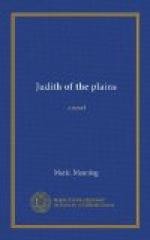But hardest of all to leave had been Archie, best and most promising of young brothers—Archie, who had come out ahead of his class in the high-school, all ready to go to The University—the University of Virginia is always “The University”; but who, it had seemed at a certain dark season, must give up this long-cherished hope for lack of the wherewithal. Mary, being four years older than her brother and quite twenty, had long felt a maternal obligation to administer his affairs. If he did not go to the university, like his father and grandfather before him, it would be because she had failed in her duty. At this particular phase of the domestic problem there had appeared, in a certain churchly periodical, a carefully worded advertisement for a governess, and the subsequent business of references, salary, and information to be imparted and received proving eminently satisfactory, Mary had finally received a tearful permission from her aunts to depart for some place in Wyoming, the name of which was not even to be found on the map. She was to consider herself quite one of the family, and the compensation was to be fifty dollars a month. Archie would now be able to go to “The University.”
As the day wore on the sage-brush became scarcer and grayer, there were fewer flowering cacti, and the great white patches of alkali grew more and more frequent. In the distance there was a riot of rainbow tints—violet, pink, and pale orange. It seemed inconceivable that such barrenness could produce such wealth of color; nothing could have been more beautiful—not even the changing colors on a pigeon’s neck—than the coppery iridescence, shading to cobalt and blue on some of the buttes.
Night had fallen before they made the first break in their journey. The low, beetle-browed cabin that faced them in the wilderness carried in its rude completeness a hint of the prestidigitateur’s art—a world of desolation, and behold a log cabin with smoke issuing from the chimney and curtains at the windows! The interior was unplastered, but this shortcoming was surmounted by tacking cheesecloth neatly over the logs, a device at once simple and strategic, as in the lamplight the effect was that of plaster. Miss Carmichael, suddenly released from the actual rumbling of the stage, felt its confused motion the more strongly in imagination, and hardly knew whether she was eating canned tomatoes, served uncooked directly from the tin, fried steak, black coffee, and soda biscuit, in company with the fat lady, the stage-driver, and the woman who kept the road ranch, or if it was all some Alice in Wonderland delusion.
The fat lady had brought her own bedding—an apoplectic roll of bedquilts— and these she insisted on making a bed of, despite the protests of the ranch-woman, who seemed to detect a covert insinuation against her accommodations in the precedent. Miss Carmichael profited by the controversy. The landlady, touched no doubt by the simple faith of a traveller who trusted to the beds of a road-ranch, or because she was young or a girl, led the way in triumph to her own bedroom, and indicating an imposing affair with pillow-shams, she defied Miss Carmichael to find a more comfortable bed “in the East.”




